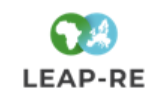LEAP-RE

As climate change becomes more and more significant, sustainable and clean sources of energy are more than ever needed
The 2030 Agenda for Sustainable Development adopted by the UN for the 2015-2030 period intends to shift the world onto a sustainable and resilient path. Among the 17 Sustainable Development Goals of the Agenda, Goal 7 is fully dedicated to energy, with the objective of ensuring access to affordable, reliable, sustainable and modern energy for all. The Sustainable Energy for All initiative, together with the World Bank and the International Energy Agency (IEA), are also redesigning the framework of access to better highlight the link between energy, services and local development.
In the European Union (EU), the EU Green Deal supports a new growth strategy, reinforcing Europe’s commitment to developing and improving renewable energies. Meanwhile, the African Union’s (AU) strategies highlight renewable energy as a critical area for ensuring the sustainable development of the continent. It is at the core of the AU’s Agenda 2063, where renewable energy is one of the priority areas for achieving the Agenda’s first aspiration: “A prosperous Africa, based on Inclusive Growth and Sustainable Development”, and specifically goal 7: “Environmentally sustainable and climate resilient economies and communities”.
Yet, much remains to be done before renewable energy is the main source of power for both continents. In Africa for example, Oxford University estimates that only a 10% share of energy will come from renewable sources by 2030 unless immediate action is taken.
A paradigm shift is required to trigger the energy-development nexus
One of the most effective ways to support this shift is to promote a pathway for empowering local research and innovation through Africa-Europe cooperation, while fostering the conditions for transforming research into effective innovation, tailored to specific societal needs, the capacities and aspirations in Africa, acknowledging regional discrepancies. For 5 years (2020-2025), the LEAP-RE programme will seek to create a long-term partnership of African and European stakeholders in a quadruple helix approach: government (programme owners and funding agencies), research and academia, private sector, and civil society. Impact will be sought by creating a framework, methodology, and cooperation model. The aim is to reduce fragmentation by aligning existing bilateral and multilateral frameworks. LEAP-RE will establish and jointly implement research, innovation, and capacity-building activities.
LEAP-RE is Horizon 2020 EU-funded project, in response to the LC-SC3-JA-5-2020 H2020 call for proposal, as well as a long-term network of stakeholders.
- 83 Partners
- 33 Countries
- 63 Months
3 pillars
LEAP-RE is based on a 3 pillars model:
- Pillar 1: External Research Funding and Capacity Building Activities
- Pillar 2: 8 key projects: Internal Consortium Research and Innovation Projects and Capacity Building Activities
- Pillar 3: Management, Coordination, Monitoring and Evaluation and development of the future long-term partnerhsip
From PRE-LEAP-RE to Leap-RE: a preparatory step for a successful partnership
LEAP-RE is based on the PREparing for a Long-Term Joint EU-AU Research and Innovation Partnership on Renewable Energy (PRE-LEAP-RE) project. This preparatory work enabled the formulation of a Research & Innovation (R&I) and Human and Institutional Capacity Building agenda on Renewable Energy (RE). It has also established the organisational and funding principles for the implementation of an African and European (AU-EU) Joint Programme by bringing together national funding agencies and other key EU-AU actors involved in RE research. PRE-LEAP-RE was thus the preparatory step toward LEAP-RE, which will be implementing the formulated AU-EU Joint Programme.